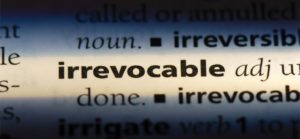By Steven J. Gibbs, Esq.
 Not all trusts are created equal. And no single trust can do everything. That is to say: you need to have the right trust for the job. You wouldn’t use the same trust to preserve assets for a loose-spending heir that you would use to hold a life insurance policy or qualify for long-term care assistance.
Not all trusts are created equal. And no single trust can do everything. That is to say: you need to have the right trust for the job. You wouldn’t use the same trust to preserve assets for a loose-spending heir that you would use to hold a life insurance policy or qualify for long-term care assistance.
A fundamental distinction among trusts involves the level of control the grantor (the person establishing the trust) has over the trust after it is created. There are two principle categories: “revocable” and “irrevocable.” As the names imply, revocable trusts allow the grantor greater control, and vice versa for irrevocable trusts. When it comes to financial affairs, all things being equal, more control is usually better. Crucially, though, there are some things you can accomplish with the latter vs. the former. With that in mind, this article focuses on irrevocable trusts, their relative benefits and drawbacks, and how they can be useful for estate planning in Florida.
What Makes a Trust “Irrevocable”?
A trust is irrevocable if it cannot be revoked. But what does that mean, right? If a trust is irrevocable, the grantor lacks the power to take back (or “revoke”) assets transferred to the trust. By definition, all testamentary trusts in Florida (trusts created through a will) are irrevocable because, by the time the trust formally comes into being, the grantor is deceased. The grantor of an irrevocable living trust cannot unilaterally amend or modify the trust instrument, change the trust beneficiaries, or terminate the trust. Conversely, revocable trusts let grantors to do some or all of those things.
The revocable vs. irrevocable distinction raises the question of why you would ever want a trust to be irrevocable. Why relinquish the power to change your mind down the road? The answer is that sometimes it is simply better not to have control. For instance, if your goal is to minimize inheritance (estate) taxes, transferring assets to an irrevocable trust effectively removes them from your estate. But, if those same assets are held in a revocable trust, they will be counted. From the IRS’ perspective, if you have the power to withdraw property from a trust and use it for your own benefit anytime you want, practically speaking, it is your property. A trustee might technically hold legal title – and that’s good enough for some purposes – but the IRS is more interested in who actually controls the property. The use of specialized irrevocable trusts in Florida to remove assets from Medicaid and SSI resource-test consideration is based on the same idea and may, with restrictions, allow for Florida income only trust planning for Medicaid.
It’s important to note that the grantor of an irrevocable trust still makes the important decisions at the outset – naming the trustee, deciding who will be beneficiaries, and defining which assets are held in trust and how they are used. But those original decisions are much more permanent than with a revocable trust.
In some limited circumstances, an irrevocable trust can be altered after inception, but almost never by the grantor unilaterally. In Florida, an irrevocable trust can sometimes be modified through a Florida power of appointment incorporated within the declaration of trust, or by a court if all beneficiaries agree or circumstances have changed so that the underlying purpose of the trust is being frustrated. But the grantor cannot do it him or herself on a whim.
How Do Florida Irrevocable Trusts Work?
Even among irrevocable trusts, individual trusts can vary immensely. Generally speaking, once an irrevocable trust is formed and the grantor transfers property to the trust, the trustee named by the grantor takes over – managing assets for the beneficiaries’ benefit and making distributions in the manner instructed by the grantor in the trust instrument. The discretion afforded to a trustee can be broad or narrow, but the trustee always has to act in the beneficiaries’ best interests and in accordance with the trust’s terms. Beneficiaries are usually (but not always) third parties (i.e., someone other than the grantor), but the grantor can also be a beneficiary. However, an irrevocable trust’s functions are limited when grantor and beneficiary are the same person (more on that later).
What can an Irrevocable Trust Accomplish?
There are literally dozens of different types of irrevocable trust designed for a variety of financial planning objectives. They can reduce or eliminate estate taxes by removing trust property from the grantor’s taxable estate. If appreciating or income-earning assets are involved, a trust could reduce income and capital gains taxes as well. Depending on how the trust is set up, income tax is still owed by the beneficiary who ultimately receives the income or by the trust itself, but the grantor can avoid tax liability, which can sometimes result in a lower overall tax bill.
For seniors in Florida, preserving or establishing benefits eligibility is often the most practical use for irrevocable trusts. Due to the ever-increasing costs of Florida long-term care, many seniors are in the unfortunate position of being unable to afford nursing home care but financially ineligible for Medicaid assistance. An irrevocable Miller trust or Qualified Income Trust in Florida can help seniors qualify for benefits in a manner that, under the right circumstances, allows heirs to eventually inherit some remaining assets.
Irrevocable trusts can also be used to take advantage of tax incentives for charitable giving while preserving an income source for the grantor. With a Charitable Remainder Trust (CRT) in Florida, the grantor transfers assets to the trust and then receives distributions for life or a defined period, after which the remainder goes to a designated charity. At the time the trust is funded, the grantor receives a partial tax deduction based upon the anticipated value of the eventual donation to the charity. A similar structure can be used to reserve income (in the form of an annuity, for example) and ultimately transfer the remainder to a non-charity third party. Of course, there is no charitable-giving deduction if the recipient is not a charity.
Another specialized trust, the Irrevocable Life Insurance Trust (ILIT) in Florida, serves the narrow purpose of holding a life insurance policy and thereby keeping the policy’s eventual proceeds out of the Florida probate court system and out of estate-tax calculations. Moreover, instead of proceeds going directly to third-party beneficiaries or to the estate and distributed to heirs, the money is paid to the trust itself. This allows the grantor to provide advance instructions to the trustee as to how the money will be used – an important feature for grantors concerned about less-than-frugal heirs.
Another option to guard against irresponsible spending, spendthrift trusts are irrevocable trusts designed to shield assets from grantors’ and beneficiaries’ creditors – or from beneficiaries’ own spending habits. Because the grantor no longer controls how the assets are used, creditors cannot reach trust assets to satisfy the grantor’s debts. Likewise, because beneficiaries cannot direct distributions, their interests cannot be attached until funds are actually distributed (and therefore are no longer within the trust). Crucially, Florida law requires spendthrift trusts to expressly prohibit beneficiaries from assigning their interests in the trust, voluntarily or involuntarily. If a beneficiary has the power to transfer his or her interest in the trust to someone else, then creditors can attach that interest, even if the power isn’t exercised.
Like most other states, Florida exempts certain classes of creditors from spendthrift trust protection. Trust assets can be attached to satisfy claims for child support and alimony, certain governmental claims, and judgments for services provided to the beneficiary relating to the trust. And Florida has another, massively important, exception to the protections provided by spendthrift trusts…
Self-Settled Irrevocable Trusts in Florida
A trust is “self-settled” if the grantor is also the beneficiary. That is, the grantor transfers assets into the trust, and the trustee uses those assets for the benefit of the grantor. There are plenty of good, legitimate uses for self-settled trusts. But, in Florida, avoiding creditors and Florida asset protection is not one of them.
Many a comment-maker has noted that, by creating an irrevocable spendthrift trust and naming yourself as beneficiary, you can enjoy the benefits of property that is effectively immune to creditor claims. Florida courts have noticed as well and have decided that the practice is void as against public policy. The idea is that, even if a trustee holds legal title, the equitable title retained by the grantor as a beneficiary has legitimate value. As a consequence, in Florida, assets held in a self-settled irrevocable trust can be attached by creditors up to the amount the trustee could distribute to the grantor, even if the trust includes a spendthrift clause. It doesn’t matter if the trustee actually would distribute the assets; if the trustee has the theoretical power to make the distribution, creditors can attach the assets.
Domestic Asset Protection Trusts in Other States
A few states, including Nevada, Delaware, and West Virginia, authorize Domestic Asset Protection Trusts (DAPT), which allow grantors to shield assets in a self-
settled irrevocable trust that creditors cannot attach. As noted, though, Florida is not one of them, and Florida courts may be unlikely to enforce a DAPT made by a Florida resident under the laws of a DAPT state, particularly if the trust holds property located in Florida. Self-settled trusts in general are valid and can be quite useful for other purposes – just not for avoiding creditors.
The Importance of Skilled Drafting
[Avoiding Boilerplate Documents]
To accomplish its objectives, a trust needs to be precisely tailored to satisfy all legal requirements of the state in which it is created. For Florida residents, this means creating a trust that achieves its specific goals while complying with all of the particularities of Florida trust law. Because trusts – and particularly specialized irrevocable trusts – can be complicated, anyone thinking about forming a trust in Florida should consult with an experienced Florida trust and estate planning attorney and avoid do it yourself (DIY) estate planning in Florida.
Steven J. Gibbs is a trust and estate planning attorney who provides complete Estate Planning, Trust Planning, Business Planning, Asset Protection, Elder and Medicaid Planning, Real Estate, Probate and Trust Administration legal services in Florida and California. Steve’s main offices are located in Fort Myers, Florida, and San Juan Capistrano, California. Estate planning legal services are provided statewide in these locations.
The Gibbs Law Office was founded by Steven Gibbs in January 2009 upon the commitment to provide client-centered legal services.
Steven Gibbs founded the Gibbs Law Office in January 2009, committed to providing client-centered legal services.
Steve as he would rather be called, is not your typical attorney. If you appreciate the staunch egotistical mannerism of most firms, you will be delighted with Steve’s unpretentious approach to educating and then assisting his client. Instead of giving you his complacent and lofty ideas, he would rather pursue your expectations with professional conversation about resolving your concerns under the Law. It’s your life and it’s his job to make your legal expectations come true while using years of his guidance and knowledge.
Steve was admitted to the Minnesota Bar in 1999, the Florida Bar in 2007 and was admitted to the California State Bar in 2014.
Along his career path, he was an associate attorney for an insurance defense law firm; an in-house real estate negotiator for Target Corporation; and corporate counsel for Civix, LLC and Vice President for North American Properties where he was responsible for various real estate transactions, including legal issues and negotiating unresolved business issues. Prior to opening Gibbs Law Office, PLLC, he was an associate with the firm of Roberts & Engvalson, P.A. where he gained his knowledge of trusts, estate planing and Wills. He opened his own firm in 2008 and now focuses on laws that will enrich the needs of his clients throughout their lives and those of their children. The firm has developed a practice dealing only with Trusts and Estate Planning, Wills, Medicaid Planning, Elder Law, Real Estate, Business Law and Probate.
Quoting from Steve “I decided to practice in areas that families will need as they progress down life’s path. To help them with a solid foundation that will carry them throughout there lives is a rewarding experience for me and my staff.”
Gibbs Law Office
8870 Daniels Parkway, Suite 101, Fort Myers, FL 33912
239-415-7495 | www.gibbslawfl.com | info@gibbslawfl.com







